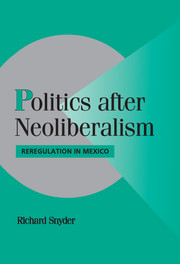Book contents
- Frontmatter
- Contents
- List of Illustrations
- Acknowledgments
- Acronyms
- Part I The Framework and Comparative Analysis
- Part II The Cases
- 3 REMAKING CORPORATISM FROM BELOW: A PARTICIPATORY POLICY FRAMEWORK IN OAXACA
- 4 WHEN CORPORATISM AND DEMOCRACY COLLIDE: AN EXCLUSIONARY POLICY FRAMEWORK IN GUERRERO
- 5 PEASANTS AGAINST OLIGARCHS: STALEMATE AND TRANSITION TO A PARTICIPATORY POLICY FRAMEWORK IN CHIAPAS
- 6 OLIGARCHS AS THE DOMINANT FORCE: AN EXCLUSIONARY POLICY FRAMEWORK IN PUEBLA
- Part III Conclusion
- References
- Index
4 - WHEN CORPORATISM AND DEMOCRACY COLLIDE: AN EXCLUSIONARY POLICY FRAMEWORK IN GUERRERO
Published online by Cambridge University Press: 03 December 2009
- Frontmatter
- Contents
- List of Illustrations
- Acknowledgments
- Acronyms
- Part I The Framework and Comparative Analysis
- Part II The Cases
- 3 REMAKING CORPORATISM FROM BELOW: A PARTICIPATORY POLICY FRAMEWORK IN OAXACA
- 4 WHEN CORPORATISM AND DEMOCRACY COLLIDE: AN EXCLUSIONARY POLICY FRAMEWORK IN GUERRERO
- 5 PEASANTS AGAINST OLIGARCHS: STALEMATE AND TRANSITION TO A PARTICIPATORY POLICY FRAMEWORK IN CHIAPAS
- 6 OLIGARCHS AS THE DOMINANT FORCE: AN EXCLUSIONARY POLICY FRAMEWORK IN PUEBLA
- Part III Conclusion
- References
- Index
Summary
In the state of Guerrero, as in Oaxaca, the reregulation of coffee occurred in the context of a powerful small-producer movement. Indeed, Guerrero's producer movement was actually stronger in important respects than its counterpart in Oaxaca. In the mid-1980s, when the independent organizations of small coffee farmers in Oaxaca represented at most 10 percent of the state's producers, the organizations in Guerrero had recruited the majority of producers. By 1989, when INMECAFE began to withdraw, Guerrero's most important independent organization had already scaled up by joining a statewide association of rural producers. Finally, in Guerrero's coffee sector, agrarian elites had virtually been wiped out by radical land reforms during the 1920s and 1930s.
As analyzed in the previous chapter, the powerful grassroots producer movement in Oaxaca was able to forge a participatory policy framework by challenging the state government's reregulation project. Because a powerful movement also emerged in Guerrero, a similar, participatory outcome would seem to have been possible. Moreover, the governor of Guerrero, like his counterpart in Oaxaca, launched a neocorporatist reregulation project. In Oaxaca, the neocorporatist project provided key incentives and institutional raw materials for a reworking from below by producer organizations. Similar incentives and raw materials should also have been present in Guerrero.
Despite these important similarities between Oaxaca and Guerrero, the new institutions that replaced INMECAFE in the two states differed dramatically. In Guerrero, INMECAFE's withdrawal led not to a participatory policy framework, as in Oaxaca, but rather to an exclusionary policy framework that denied producers a role in the policy process and failed to improve their welfare.
- Type
- Chapter
- Information
- Politics after NeoliberalismReregulation in Mexico, pp. 97 - 133Publisher: Cambridge University PressPrint publication year: 2001



